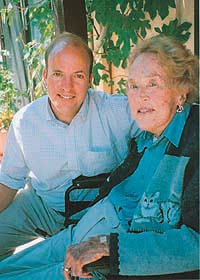Alex Prud’homme on life with Julia
Child's memoirist at GSU on Thursday

Journalist Alex Prud’homme, great-nephew of Julia Child’s husband, offered many times to help Child with her memoirs, but she didn’t accept his offer until just eight months before her death in August 2004. Their brief collaboration led to My Life in France, the recently published memoir that Prud’homme wrote with Child (Hon.’76) based on interviews and family letters.
Prud’homme will discuss and read from My Life in France at the Place, Taste, and Sustenance conference that begins at Boston University this week. Cosponsored by the Association for the Study of Food and Society and the Agriculture, Food, and Human Values Society, the event features lectures, workshops, tasting events, and city tours. More information is available at Metropolitan College’s Lifelong Learning Web site.
Prud’homme discussed the book with BU Today earlier this week. His reading takes place Thursday, June 8, at 6 p.m. in the George Sherman Union Conference Auditorium at 775 Commonwealth Ave.
BU Today: When did you first meet Julia?
Prud’homme: I knew her from day one. I was born in 1961, which is when Mastering the Art of French Cooking was published — we lived in New York and they lived in Boston, and Paul and Julia used to come down to New York all the time for food- and book-related events. We would watch her on TV, and an hour later she would show up in my parents’ kitchen. When you’re a kid, that’s cool.
Later on, as a teenager, I came to understand that she was something special, because every time we would go out to a restaurant, the maitre’d would stick us at the largest table in the middle of the dining room. And after a meal, she would always go back into the kitchen and thank literally everybody, from the head chef to the carrot peeler to the dishwasher. I learned a lot from her just by example, taking the time to reach out to everyone and to be nice to everyone.
I learned that having a meal with Julia was never a simple proposition or a quick one, but it was worth it.
How did this literary collaboration happen?
It first occurred to Julia and her husband, Paul, in 1969; Paul and Julia were living in France, and wrote to my grandparents every week, and my family saved the letters. In 1969, Paul thought it would be a good idea to do a book based on the letters.
Julia had always considered those years in France the best of her life, the time when she defined herself, and as she said, had a “flowering of the soul,” discovered her raison d’être in life. She kept talking about doing the France book as long as I could remember — I wanted to work with her, but she was a very self-reliant person and wanted to do this on her own.
Finally, it was December of 2003, and she was 91 years old, and her health was really up and down. I went to visit her once a year, as I always did, and I said, “Julia, how’s the France book coming?” And she said, “Well, dearie, it’s not so good right now.” And we started writing the next day. We really worked on it for about eight months together, from January through August 2004, when she passed away. I took another year to finish the book.
How did you re-create Child’s experiences?
My job was to take things that Julia had written, to take things from the letters, and to take information I’d gathered from my interviews with Julia so I was able to weave all of that stuff together in this book. It’s mostly Julia’s real words — she had an active hand in a lot of it, and it was really fun.
How did her death affect your experience writing the book?
For the year after her death that I worked on the book, literally every day I had a question for her — why was the first meal you served Paul brains simmered in red wine sauce? What made you think that was a good idea? I wanted to know more about some of the serious subjects, like the fact that Paul and Julia never had children — I got into that a little bit with her, but never got a satisfactory answer. Her relationship with her collaborator, Simone Beck, was very intense and very productive for the first two cookbooks, and they had a professional parting of the ways, and although they remained friends for the rest of her life, I wanted to know more about how the professional schism between them happened. Many, many questions, everything from the ridiculous to the sublime.
What did you hope to accomplish with this book?
She’s obviously a fascinating person with a really interesting set of stories to tell. I thought that was worth sharing, and she did too. She wanted to share the excitement of those years in France, and by doing that, get other people interested in the same way that she was, to inspire them, and pass on this message that if she could do it, anyone else could too. The tone I was aiming for was, I wanted the reader to feel that we were sitting around a little café table, having a glass of wine or a cup of coffee, and Julia was there telling you a story.